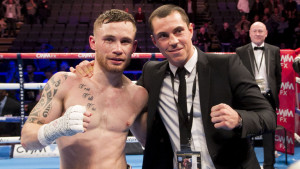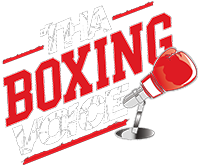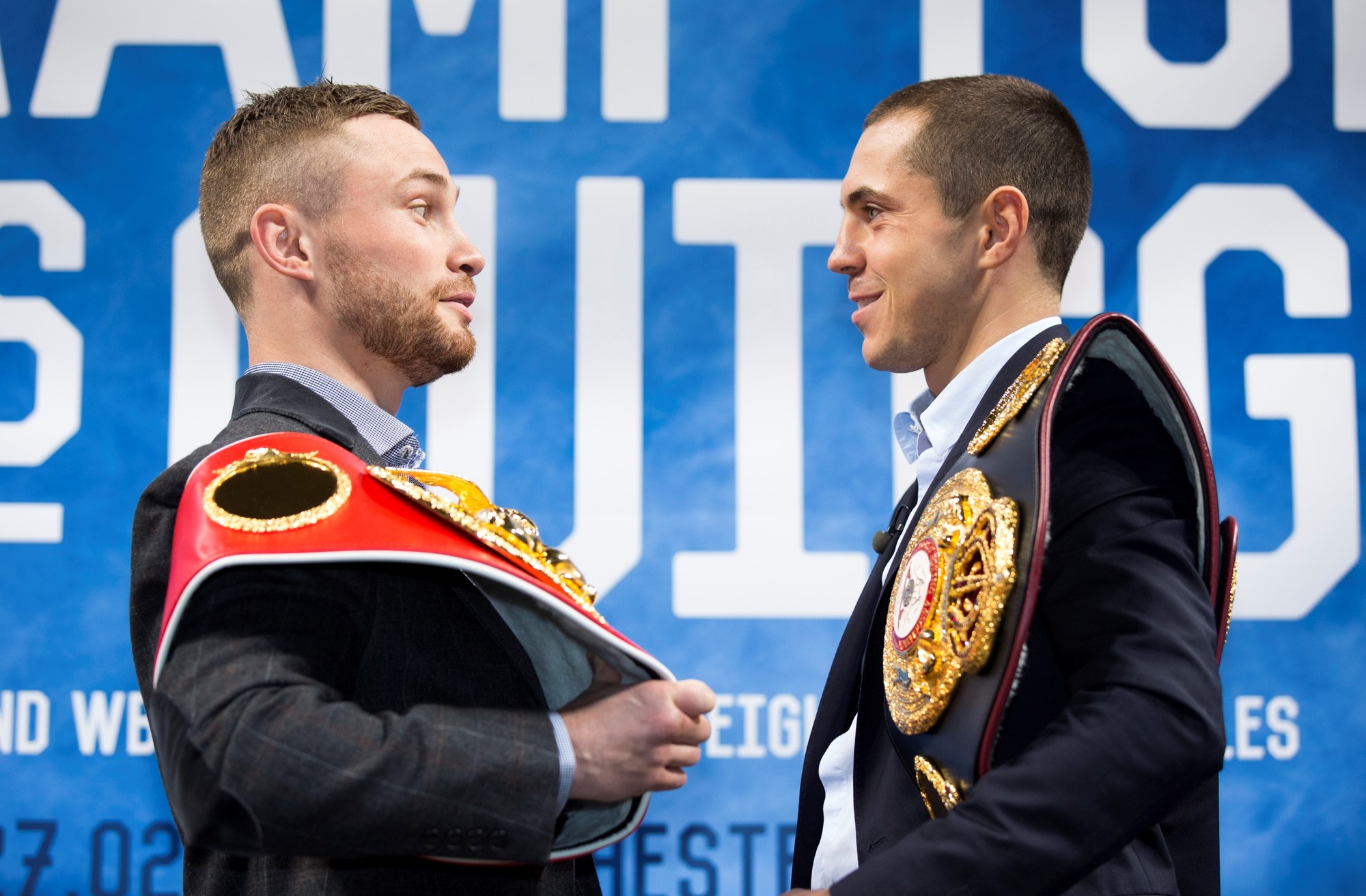 It wasn’t the fight that most of us thought it’d be. Most of us expected more, but even if you weren’t expecting much, you had to be expecting more than what we got from the highly anticipated Frampton-Quigg showdown.
It wasn’t the fight that most of us thought it’d be. Most of us expected more, but even if you weren’t expecting much, you had to be expecting more than what we got from the highly anticipated Frampton-Quigg showdown.
Carl Frampton was able to unify his IBF junior featherweight title with his split-decision victory over Scott Quigg to pick up the WBA title in front of a raucous crowd at the Manchester Arena in Manchester, Lancashire.
Frampton established the jab early and he was moving well, although not nearly as well as he’d move later in the fight. It wasn’t much happening through the first three rounds. I mean, there weren’t many action-packed rounds to begin with, but the first half of the fight was the dullest, and the first three rounds were brutal.
Again, it was Frampton’s jab that was keeping him ahead- that, and Quigg’s refusal to take any risk. And forget risk, Quigg could’ve at least tried and established a workable offense. He was giving rounds away with huge gaps between produced offenses.
It wasn’t as though Frampton was running away with rounds. In fact, there were many rounds that were straight difficult to score. But Frampton was the de facto winner of some rounds—a lot of rounds. Frampton didn’t go out there and earn every second of the first half of this fight, but, instead, he was the winner by default, the lesser evil.
Quigg wasn’t completely silent with his offense, in all actuality, he landed the more meaningful shots through the first four to six rounds. The problem is those punches were all one and done. Quigg would land a right hand of significance and then turn in an incomplete for the rest of the round. If he’d have strung together another 3-4 of those single right hands in a given round it would’ve probably been enough to win a 10 each time.
Around the halfway mark, Frampton started to move with more grace and higher sustainability. He was becoming more and more comfortable and you could see the confidence growing inside a man aware of his control over the fight. Quigg, to his credit, never seemed too flustered, and there were signs of aggression from the Bury, Lancashire-born fighter.
Frampton was in control, then something great started to happen as the fight shifted into what we all expected. It didn’t happen all at once, it was gradual. But you could see the signs in the second half of the fight. They were subtle, but you could see a sort of shifting in the bearings of the fight.
Then, in the 10th, boxing fans were treated to a round in a fight that we all had expected. It had action, it had aggression, it had high-level boxing ability, it had calculated and artistic violence, and, best of all, it had competitiveness.
Quigg was aggressive, Frampton was brilliant. Both fighters were methodical in their own way. It was, in a lot of ways, like what I’m told birdwatching is like—a lot of down time before your patience is rewarded with a single act of indescribable poetry in motion. It was majestic and natural, and it totally changed the landscape in the fight.
However, was the urgency brought on too late for Quigg? Was this a last ditch effort or a miscalculation? He finally got going, but it brought out the best in Frampton.
Quigg fired his right hand and worked the body. He was causing damage, but Frampton would not be bullied as he fought back with levels.
In the 11th round, at the 1-minute mark, Quigg landed a pair of devastating body shots with the right hand. He dug into Frampton’s body. But Frampton responded with some vicious body shots of his own. However, it was Frampton that looked at his corner with a concerned look.
The 11th round closed with Quigg undoubtedly on top. He made Frampton feel his power and the punishment overcame Frampton. In the last sequence, Quigg landed what had to be the best right hand in the fight and it caused some concern for Frampton.
Quigg had to know he needed the stoppage in the 12th, but Frampton was the one who came out with something to prove. He returned to basics and Quigg tried to muscle his way through the superiority of Frampton’s game.
To their credit, the UK fans never were out of the fight and remained enthusiastic throughout the early and dullest instances of the fight. Their convictions were rewarded in the 12th as both fighters let loose and desperately tried to upstage the other. Quigg, who waited far too long to get in the fight and establish his game, maintained his thoroughness while Frampton attempted to establish his dominance. It made for an interesting final round.
The fight went to the scorecards and the judges turned in the scores of 115-113 for Quigg, 116-112 for Frampton, and 116—112 for Carl Frampton who unified the junior featherweight titles by split-decision.
In the end, Quigg should’ve started much earlier and it should’ve been a unanimous decision for Frampton. It was obvious that there were plenty rounds that came down to a toss-up due to inactivity on the part of both fighters. That said, Frampton did enough to win the fight.




